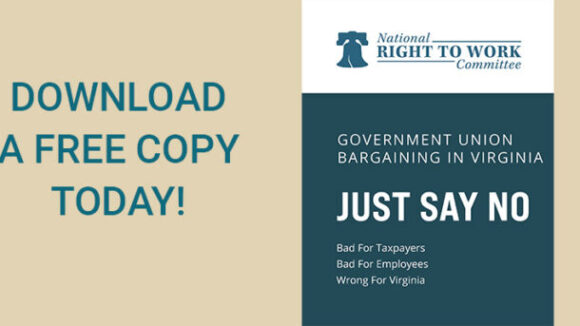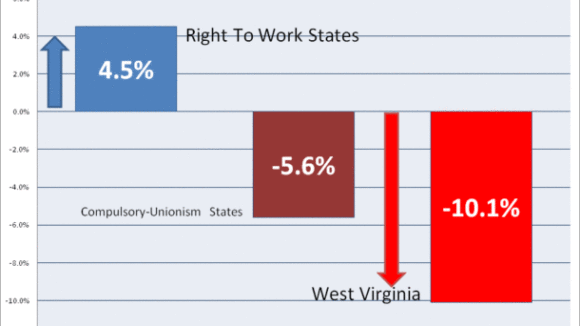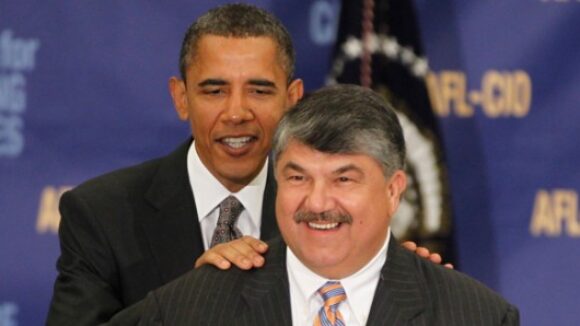How Collective Bargaining is Negatively Impacting Teachers and Students
If you’re a teacher, your collective bargaining might be negatively impacting you and your students more than you think.

If you’re a teacher, your collective bargaining might be negatively impacting you and your students more than you think.

Just say no to government union bargaining in Virginia In our Republic, all citizens have a right to petition their elected officials for redress of grievances, but no one should have special access to decisions over spending public funds, which monopoly bargaining grants union officials.

West Virginia’s working population has a negative growth rate exceeding 10% per year according to a November 2015 Fact Sheet by the National Institute for Labor Relations Research (NILRR.org). It is not surprising since Big Labor Bosses negotiate monopoly…

Below, the National Right to Work Legal Defense Foundation provides the steps necessary for employees who wish to remove unwanted “union representation” from their workplace: Decertification Election [En español] WHAT IS A DECERTIFICATION ELECTION? You (or someone you…

Big Labor embarked on a project to push legislation that will force all private-sector workers to be under a union-controlled contract with their employers according AFL-CIO head honcho Richard “Dick” Trumka. During and after a meeting with Wall Street Journal reporters…

By Larry Sand On August 13, 2013 · (From UnionWatch) Teachers union treasurer perpetuates myths about worker freedom. The term “right-to-work” (RTW) very simply means that workers don’t have to pay…
Rhode Island State Rep. Joe Trillo (R-Warwick) has introduced legislation to make Rhode Island a Right to Work state. It’s an uphill fight but Trillo has gotten the ball rolling.

Ohio Governor-elect John Kasich intends to overhaul current state employees' collective bargaining rules (passed by Big Labor-financed state legislators and signed by a Big Labor-financed Governor) that he says allow unelected third parties to force the state of Ohio its counties and towns to raise taxes without any say by taxpayers. Kasich also intends to dismantle federally imposed wage rules that drive up construction costs. A better idea would be to give all workers in Ohio the right to choose to pay or not pay union dues or fees, rather than being forced to pay dues and fees as a condition of employment. Ohio needs a Right to Work law to protect all employees. Reginald Fields of The Plain Dealer wrote: COLUMBUS, Ohio -- Public employees who go on strike over labor disputes should automatically lose their jobs, says Gov.-elect John Kasich. "If they want to strike they should be fired," Kasich said last week. "I really don't favor the right to strike by any public employee. They've got good jobs, they've got high pay, they get good benefits, a great retirement. What are they striking for?" Kasich has made it clear that dismantling Ohio's collective bargaining law will be a top priority of his administration. The 1983 collective bargaining law, which gives public employees a right to unionize, was implemented by a Democratic-controlled legislature and signed by Democratic Gov. Richard F. Celeste. In particular, Kasich is going after binding arbitration rules … "You are forcing increased taxes on taxpayers with them having no say," Kasich said. The Middletown City Council recently tabled a resolution asking the Ohio General Assembly to revise the state's collective bargaining law. City Councilman Josh Laubach, who authored the resolution, said the city had to dip into reserves to pay police and fire costs this year and is expecting a $2.5 million increase in safety personnel in 2011 despite adding no new positions, according to the Middletown Journal. The 1983 collective bargaining law, which gives public employees a right to unionize, was implemented by a Democratic-controlled legislature and signed by Democratic Gov. Richard F. Celeste.